The fashion industry has grown in leaps and bounds, not all of it in the right direction. The current crisis gives an opportunity to address the malaise and clean up the house. In an exclusive for the readers of The Luxury Chronicle, Meher Castelino spoke to various stakeholders in the fashion industry about the two key fashion weeks in Delhi and Mumbai, about their relevance, and the expected changes.
May 2020
 It has been a slow evolution, from fashion shows to fashion weeks in India. An exciting and glamorous journey from the first fashion show in Pune during 1930, to the glamorous event in 1932 presented at the Taj Mahal Hotel Mumbai, by Catherine Courtney, the popular designer known as Madame Pompadour (whose haute couture boutique at the Taj Mahal Hotel was the venue of glittering gowns), fashion shows have come a long way.
It has been a slow evolution, from fashion shows to fashion weeks in India. An exciting and glamorous journey from the first fashion show in Pune during 1930, to the glamorous event in 1932 presented at the Taj Mahal Hotel Mumbai, by Catherine Courtney, the popular designer known as Madame Pompadour (whose haute couture boutique at the Taj Mahal Hotel was the venue of glittering gowns), fashion shows have come a long way.
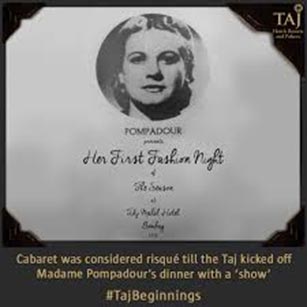
In the 50s, 60s, and 70s the Indian textile mills used the fashion runway to present their latest fabrics, which were turned into stunning creations. When ‘Ensemble’ the first high fashion multi-designer store opened its stylish doors in 1987, Mumbai became the Mecca of fashion. A new genre of fashion designers emerged in the country as stores mushroomed all over India with collections and fashion shows. Giving the fashion business further impetus, the government in 1987 started the National Institute of Fashion Technology in New Delhi. Soon the concept of fashion institutes became another great idea with hundreds of local and foreign schools opening their doors to starry-eyed students who visualised themselves as international stars.
In 2000, the first fashion week Lakmé India Fashion Week in New Delhi spawned a blitz of copies all over India. From metro cities to tier 2 and 3 towns and even suburbs, fashion weeks brought together a gaggle of newbie designers. The fashion shows/weeks turned into not only thriving businesses but also into glamorous entertainment, at times presented at even weddings and corporate events.
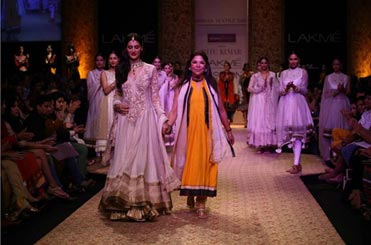
Come March 2020, Covid-19 caused a blood bath of unimaginable scale in the fashion business. The various segments of the industry are stunned into silence as they try to make sense of this global crash on all fronts.
FASHION INSTITUTES
What is the future of the fashion institutes in India since they are the creators of future designers? Will fashion shows, which are the culmination of graduation, be as important? How will they change?
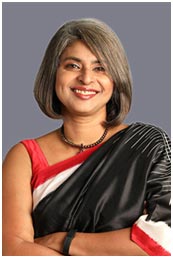
Head of one of the premier design and fashion institutes in India, Nandita Abraham, President, Pearl Academy, observes, “The Industry is engaged in re-imagining the future of fashion weeks. The way we approach or envision the business of fashion weeks or shows will change. Digitalization will further elevate the democratization of fashion industry, a world, which has always been associated with mystery and elitism; might start to become more accessible and ambiguous. It will create new opportunities and a path for diverse dialogue and cultural exchange. It’s a way to engage the ever-growing digital savvy consumer, to make it more relevant by transforming their 10 minutes event into something that lasts forever, which physical runway shows might not be able to achieve. Sustainability is not a choice anymore; it is essential. Fashion brands, big or small can no longer get away without having any stance on sustainability. It is more than mere lip service. A traditional fashion show is not an advocate of sustainability. Up cycling, rolling out menswear and women’s wear together, renting things and using organic materials are some of the key elements.In spite of all the uncertainties and paradoxes, fashion and its nature of business is a true reflection and spirit of the time that we are living in. It holds a mirror up to our culture and how we have evolved as an individual and global citizen.”
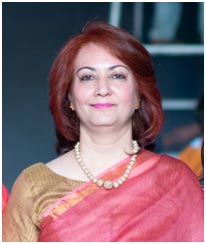
Dr. Bhawana Chanana, Director and Professor, School of Fashion Design and Technology, Amity University Mumbai, feels, “Both the fashion weeks in Mumbai and Delhi are the biggest high-profile fashion events for businesses to get the right publicity and conspicuous trade platforms that nurture designers, their labels and serve as a brand-building opportunity which leads to brand recall. For our aspiring designers they are a Launchpad.” She further adds, “Fashion weeks need to shift from sponsors. Their visibility should become design-centric and focus on quality. Though the participation of design institutes and brands is rising, lack of foreign buyers, and a corporate structure makes the current fashion show set up less sustainable or conducive to creativity.”

Dr. Manju Hundekar, Principal MKSSS’s School of Fashion Technology, Pune, states, “Fashion Shows are an exclusive medium to communicate fashion in a creative environment that showcases a designer’s innovations, and stimulates the senses of Fashion Buyers. In a way it is a promotion of Fashion that has a Trickle Down Effect. Under one roof, the buyers get an opportunity to judge the creations for its market potential. It is a live experience, a most effective tool to showcase new trends, and act as a best medium-providing platform for the talented student designers.”

Raju Bhatia, Consultant, Fashion/Academics Brand Strategist, says, “The Fashion Show has evolved from an exclusive in-house presentation held for a private clientele to a biannual presentation at Fashion Weeks that is now viewed by a vast cross section of consumers, media and fashion industry buyers and sets trends. However, many Fashion Shows/Weeks are just entertainment and seriousness is lost. The business aspect is over shadowed by Glamour and Glitz. The Celebrity Show stoppers rule the Ramp and Media and collections are sidelined. Fashion Weeks should be more focused, support and promote new designers on the horizon. They should have a good Buyer Database and segregate the days of the week into different fashion categories for better buyer response, create trends in fabrics, prints, colours and styles. There should be a Trends Council in India catering to the Indian and International Markets that predicts the seasonal trends and designers should follow that.”
DESIGNERS’ VISION
Fashion weeks are the basis for nearly every designer who wants to sell the latest collection so how do these vital segments feel about the coming months.
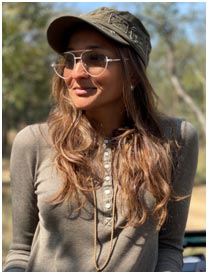
Designer Anjali Patel Mehta, creator of the label Verandah that specializes in resort wear feels, “Given the current scenario, traditional fashion weeks don’t really make sense right now. Designers will digitally send their message across. Fashion weeks could adapt to give an integrated platform to present their message. Currently retail and luxury spending takes a hit, conscious fashion and supporting local businesses takes precedence. I do hope the retail landscape turns for the better in 2021 and that fashion weeks find a new meaningful way to present creative work across the design spectrum.”

Akaaro’s Gaurav Jai Gupta who is a regular part of most fashion weeks reveals, “I think fashion weeks and shows as a platform are very relevant. They help a designer to communicate the brand narrative in the most effective way. They add energy to young brands and also work as a reminder for the consumer.Given the current situation we will have to rethink and come up with a new format, which is safe and works for everyone. We need to change the way shows are done and received in India. They almost need a clinical surgery in terms of format, idea, quality and meaning.”

Amit Vijaya and Richard Pandav of the Amrich label are also part of most fashion weeks. “Fashion shows have been an excellent medium to present the creative visions of designers and the Fashion Weeks have been a great consolidation of the variety of talent. They allow the buyers and media to view what the future holds and plan accordingly. With Covid19, we need to look at alternative methods of displaying our work, with an increase in the virtual collection showing. The format of showcasing has to change to a more focused approach to relevant markets. Our clothing is more tactile would need swatch books, which could be mailed to buyers along with the virtual presentations. Till normalcy returns, the idea of Fashion Weeks needs a major rethink to ensure precaution/safety at all times.
FASHION SHOWS/WEEKS
For a quick compact showcase of a designers’ collection nothing beats fashion shows/weeks. For many brands/sponsors this is the best way to promote their products and there is a great rush to be part of the best designer’s collection.

Avinash Mane, Commercial Head, South Asia, Lenzing AG, has regularly showcased fibres like TENCEL™ and ECOVERO™ at fashion weeks. He feels, “Fashion shows remain one of the best formats, which bring so many aspects of a collection together – how the outfits look on an actual person, its aesthetics, drape and appearance as the mood comes out in full glory in a good runway show. It gives the audience a holistic idea behind the collection and becomes a culmination point. The need to switch towards completely sustainable products needs to be prioritized, now more than ever. While there are successful platforms like the Sustainable Fashion Day at Lakmé Fashion Week, which was an idea we pushed together with IMG Reliance, there is a huge scope for other platforms to integrate sustainability as a core in their offerings. Fashion shows/weeks are not just collection launch events but a platform to display an idea, which further trickles down to inspire a larger set of audience.”

Pallav Ojha, CEO & Co-Founder India Beach Fashion Week and Como Designers Collective, pioneered the category of the Resort and Beachwear Week in 2015, which he has organized for 6 seasons. He said, “Fashion Shows/Weeks are relevant depending on the organizers’ visions who conduct them! Some want the designers; trade, industry and buyers (both B2B and B2C) to connect with each other for the industry, growth, trade and commerce to showcase the new collections, utilize media and marketing tools, influencers, to reach more people. Other promoters/brands/organizers utilize the glamour side of fashion to launch their product as surrogates, build network and visibility without any trade or commerce idea for the industry but an entertainment tool. Many organizers think it is a quick moneymaking business and to gain limelight until they fail. Now genuine players need to consolidate and build platforms, which are effective and business oriented for the industry. It is time to fight the challenges post Covid-19 as an industry for maximum business conversion by utilizing technology along with deep consumer insights. Fashion shows/weeks should become effective and business oriented for every fashion professional in the industry.”

Amit Bhardwaj, Co-founder, 6Degree has been part of fashion weeks promoting designers, comments, “Fashion shows/weeks will still be relevant as they are an ideal platform to showcase latest trends, new talents, and innovations. Going forward, there will be drastic changes in the way the Fashion Weeks are conducted and presented. We would also see more focus on sustainability and business. We will witness more private shows for buyers and media by individual designers and move towards Digital Virtual Shows.”
FASHION WEEK PRODUCTIONS
The fashion shows were at their peak right from the 50s to the 80s, with textile mills displaying their latest fabrics. At this time, it was the choreographers of the shows who doubled up as designers. With the advent of the multi-designers shows/ weeks, choreographers and models became the stars, as grand extravagant events, complete with lasers, strobes, background mapping, international models, limitless budgets, a front row of celebrities and movies stars as well as expensive showstoppers. But where will all this go with social distancing and falling sales?
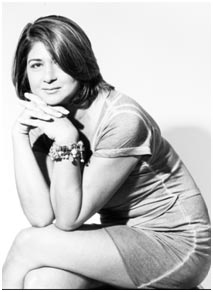
Lubna Adam, ace choreographer/show director, states, “Fashion shows, and Fashion weeks are really important to the industry as they bring the latest product on one platform, which is then uploaded on social media, buyers and private audience. The designers get to show their latest at the Fashion Weeks, which are a great brand and marketing tool and very essential, or fashion would not be able to survive. After Covid-19 fashion shows/weeks will have smaller audiences, with more models, to space them out along the ramp. The audience will be slightly smaller or the venues will have to be larger, to allow social distancing, money may be required for marketing. Don’t know where or how it will go but without it the entire fashion industry will come to a stand still. It’s crucial to get more space, smaller audiences and still be able to give appealing presentations.”
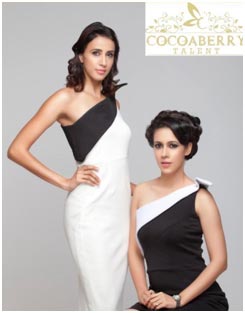
Alesia Raut & Anjali Raut, Founders, Cocoaberry organize shows, contests and events all over the country. “The importance of fashion shows/weeks can never be undermined as they form a catalytic synergy between commerce and creativity alongside all the associated faculties on a singular platform. Even with the advent of technology and the convenience of digital/online display, the magical aura and captivating energy of live shows is irreplaceable and incomparable. With Covid-19 safety protocols will not only be a decisive factor but also influence designing. ‘SAFE TO WEAR’ could be the new fashion trend.”
While show organizers are putting their thoughts together, models too have their apprehensions. Sucheta Sharma James, super model and Co-Founder of “My Fitness Trainer” admits, “Fashion is part of everyone’s 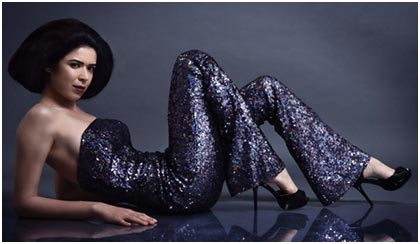 life, some live it every day, some occasionally indulge in it. A fashion show displays a particular mood but fashion weeks cover everyone’s taste and requirement. Therefore, they both are equally important. The approach towards both will change, as fashion events will cater to audiences digitally. Cost cutting in huge sets or establishments, social distancing will force social media to surface, hence technology will take over from man power.”
life, some live it every day, some occasionally indulge in it. A fashion show displays a particular mood but fashion weeks cover everyone’s taste and requirement. Therefore, they both are equally important. The approach towards both will change, as fashion events will cater to audiences digitally. Cost cutting in huge sets or establishments, social distancing will force social media to surface, hence technology will take over from man power.”
